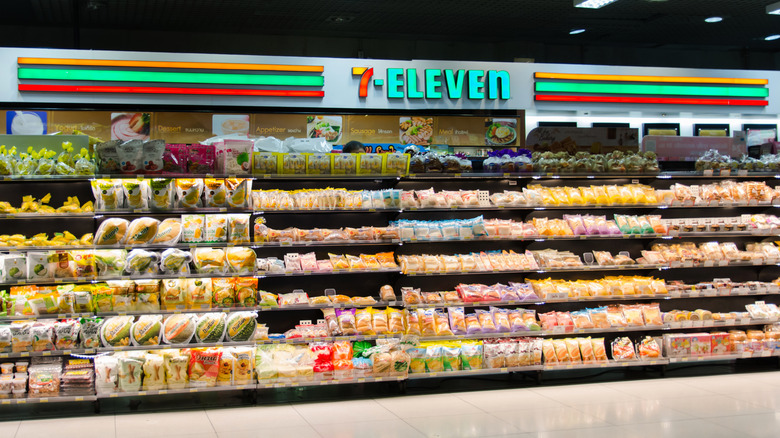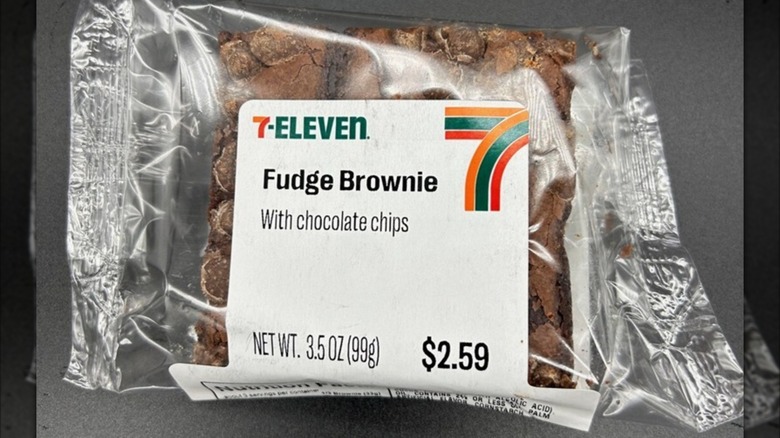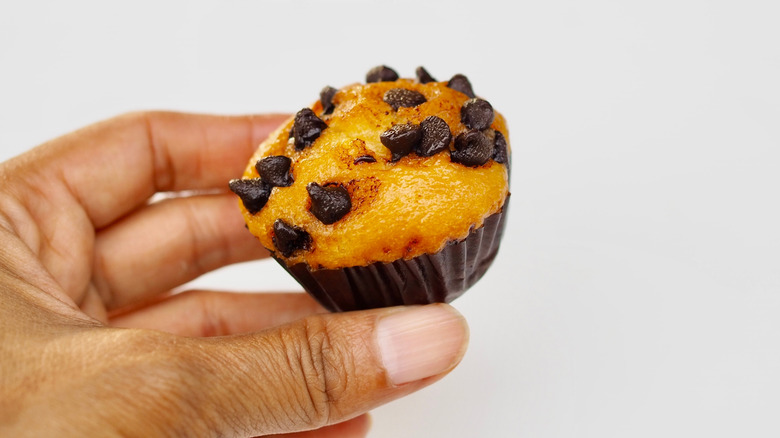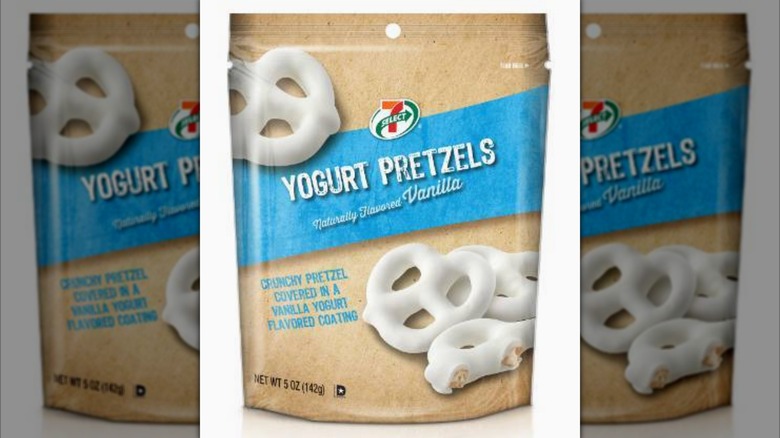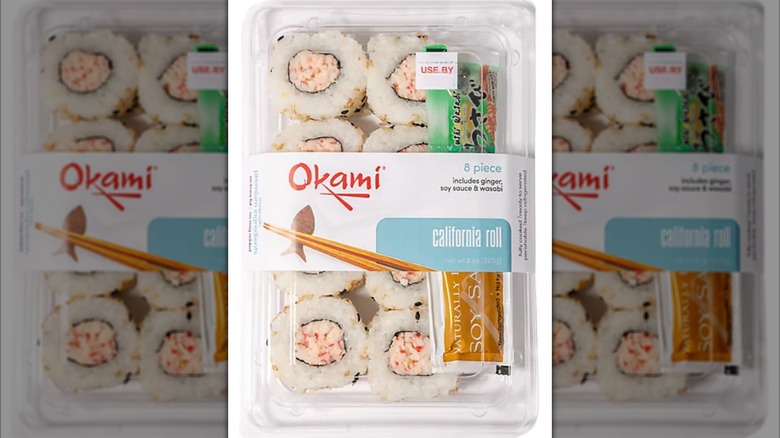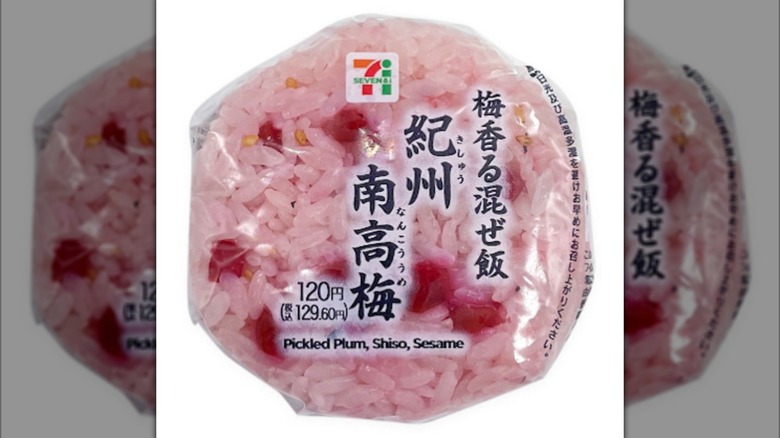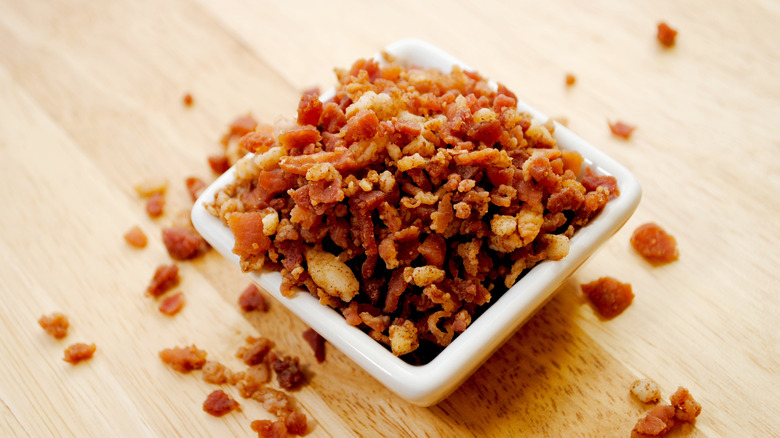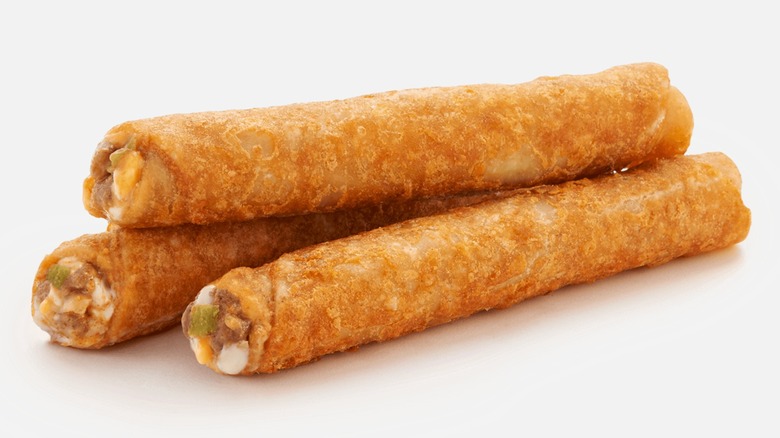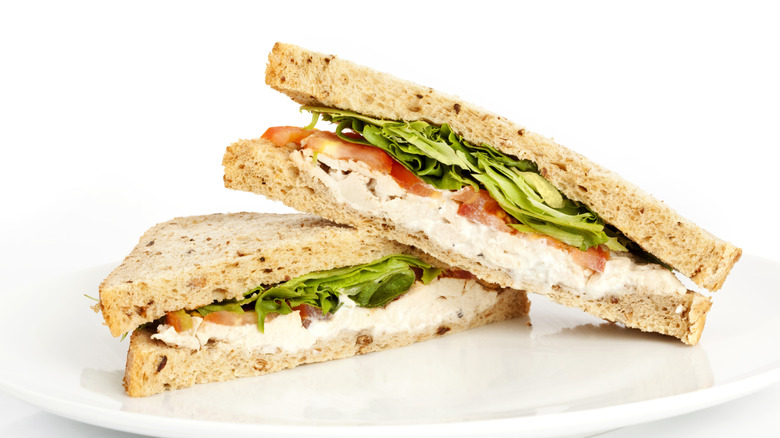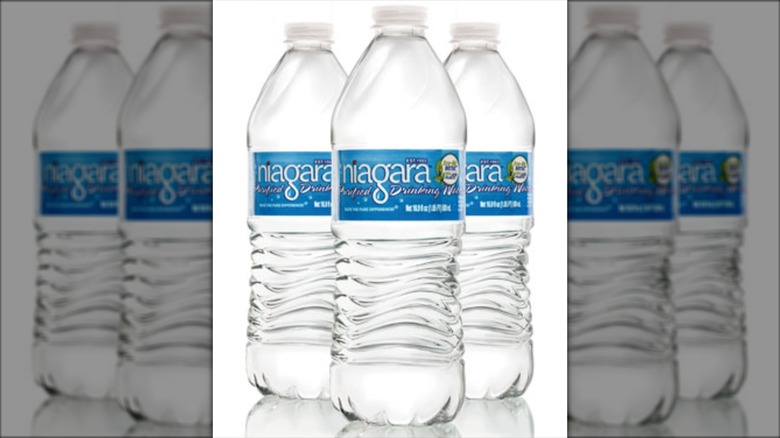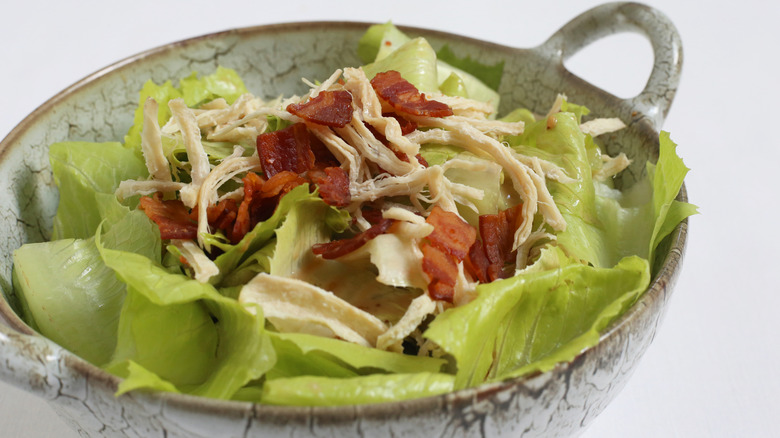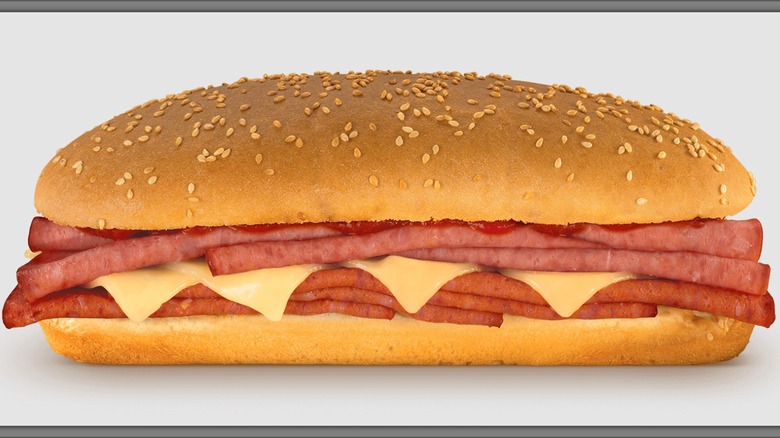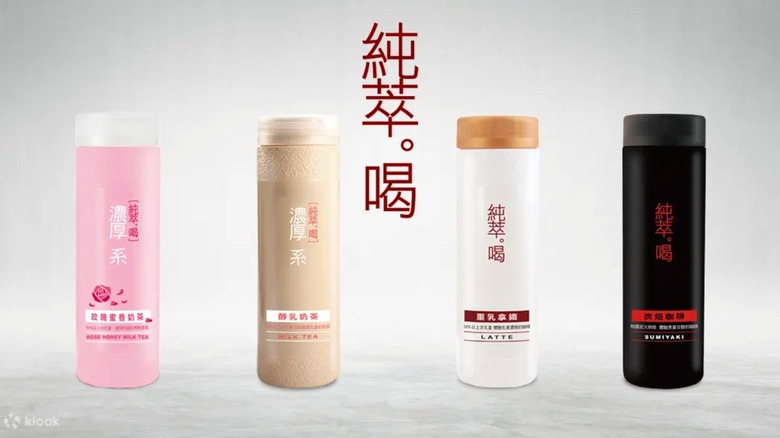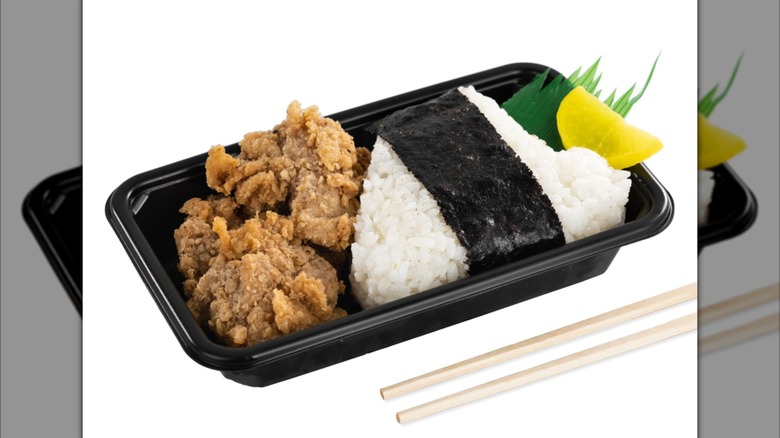14 Of The Worst 7-Eleven Food Recalls You Should Know About
We may receive a commission on purchases made from links.
Wherever you are in the world, there's a strong chance that there's a 7-Eleven nearby. The convenience store chain that experienced a post-prohibition resurrection is a giant, growing to a business with more than 84,000 stores in 19 countries in the near-century that it's been operating. However, the larger the number of stores, the greater the possibility for things to go wrong -– and in 7-Eleven's case, they really have. 7-Eleven has been plagued by various food recalls throughout its years, with some of them being pretty damaging for the brand.
7-Eleven's recall history has been marked by numerous cases of foodborne bacteria, with Salmonella and Listeria contamination a common cause of stress (we all knew that convenience store food wasn't the safest, but this really takes the cake). It's also been hampered by recalls on items that have incorrect allergen information, creating significant risk for their customers. That's not even the worst of it, though. In some cases, 7-Eleven has had to recall food because of insect contamination, with one incident involving cockroaches bound to turn your stomach. After you check out these recalls, you'll be thinking twice before you grab that food at your local store.
1. In 2024, its brownie recall was given a Class I risk definition
Gas stations may not be the most appealing places to get brownies, but they're far from the riskiest item you can buy at them. In October 2024, though, that wasn't the case. 7-Eleven had to put out an urgent recall for batches of its brownies produced on September 8 and 9 and shipping to its stores around Southern California. The reason? The offending Fudge Brownie with Chocolate Chip product contained walnuts, a potential allergen that wasn't listed on the ingredient list.
Just over 2,000 brownies were distributed with this massive mistake on their labels, but the error was a huge issue for 7-Eleven, and caused the U.S. Food and Drug Administration (or FDA) to declare a Class I risk definition. It's worth noting just how serious Class I recalls are. The FDA them as "a situation in which there is a reasonable probability that the use of, or exposure to, a violative product will cause serious adverse health consequences or death." Given that walnuts can cause serious symptoms and potential death in individuals with tree nut allergies, the organization was wise to elevate it to the highest risk level.
2. Muffins sold in 7-Eleven were recalled due to Listeria
Listeria, Salmonella, and E. Coli are in many ways the unholy trinity of food recalls. These foodborne bacteria, which can prompt food poisoning and deeply unpleasant symptoms, are the case of a large proportion of recalls from major supermarkets and convenience stores. 7-Eleven has had more than its fair share of these bacterial nasties, and in 2021 it was Listeria's turn. The store was part of a recall for a wide selection of muffins that it stocked in its stores, made by Give and Go Prepared Foods (U.S.A.) Corp. after the brand found test results that flagged a Listeria presence in them.
The good news for 7-Eleven was that while this recall encompassed over two dozen kinds of muffins sold in several different retailers, the convenience store only had to seek out two individual muffin products with 7-Eleven branding. The bad news, though, was that Listeria is far from a laughing matter. Listeria doesn't cause any visible signs of spoilage or deterioration, and therefore can operate invisibly — but it can be astonishingly harmful, and in some situations life-threatening. It's particularly dangerous to young children, who of course are happy to wolf down any muffin put in front of them, making this particular product even riskier.
3. 7-Select Yogurt Pretzels were recalled after they were found to potentially contain peanuts
Mislabeling is one of the most serious reasons that a product can be recalled, and not just because you're left with improper nutritional information. Products are frequently mislabeled to omit allergen information, and when this happens, people can unwittingly be consuming food items that may be dangerous and harmful. What's even more dangerous is that these items can often contain allergens that you really wouldn't expect — like in 2020, when 7-Eleven had to recall its 7-Select Yogurt Pretzels because they contained peanuts.
Coming in a standard vanilla flavor, nothing about these pretzels indicated that they might contain peanuts, and normally they wouldn't have. The issue arose when 7-Eleven discovered that the pretzels it was selling had been mixed with a peanut-containing product, which opened up the risk of cross-contamination and allergic response. As you might expect, 7-Eleven was quick to manage the situation, both in its stores and in the public eye. "Upon learning of the safety alert, we took immediate action to alert stores to remove the affected products from shelves," a spokesperson said to CSP Daily News.
4. The store was involved in a wide-scale sushi recall
There's an argument to be made that anyone who buys gas station sushi is somewhat playing with fire when it comes to their health. While there are some 7-Eleven food options that are definitely healthy, the argument that its sushi might not be was kinda proved true back in 2019. 7-Eleven was one of the many stores that was involved in a recall Fuji Food Products, Inc. put out for its ready-to-eat sushi, spring rolls, and salads. The reason for this recall, as with so many others, was the potential Listeria in its products. Inspection staff had found the presence of Listeria in its Massachusetts production facility, which led the company to get its products back as soon as possible.
To be fair to 7-Eleven, the convenience store was just one piece of a much larger puzzle with this recall. Fuji Foods had shipped its products to stores, and was selling potentially contaminated items in Walgreens, Trader Joe's, Food Lion, Superior Foods, and Giant Eagle. The fact that the products had been shipped to 32 different states didn't help matters, either. Thankfully, nobody had become ill from eating any of its products at the time of recall.
5. In Japan, 7-Eleven had to recall rice balls after cockroaches were found inside them
There's rarely a good reason to recall a product, but cockroaches inside food has to take the prize for the most disgusting one. In 2023, 7-Eleven had to reckon with that very real reason at its stores in Japan. The convenience chain, which has a huge presence in Japan, was faced with recalling thousands of its rice balls after two individual customers found cockroaches nestled in them. These rice balls had made their way to roughly 370 stores across Saitama Prefecture, making tracking them down especially difficult.
7-Eleven believed that the source of the contamination was at the plant where the rice balls were made, which was clearly suffering from some less-than-sanitary conditions. The fact that the affected rice balls were both bought in the same store didn't change matters much, as the company still needed to perform due diligence and recall every single one made in the same time period. If there was one saving grace, it was that neither of the customers actually ate any cockroaches. Instead, they both noticed that the insects were nestled inside the plastic packaging before they chomped down on them.
6. Almost 2 tons of bacon bits were recalled after potential Listeria contamination
How harmful can a tiny bacon bit be? Well, as it turns out, pretty harmful. In 2009, 7-Eleven had to put out a recall notice of almost 2 tons of bacon bits (3,600 pounds, to be exact) that had made its way into various burritos and sandwiches that it was selling in its stores. The recall had been connected with an entirely different recall involving the burritos and sandwiches in question, and it seems that once further rigorous testing had been done, it was discovered that the bacon bits were to blame.
This was yet another case of Listeria contamination, with the problem only being discovered when one store had tested the bacon bits and found that there was Listeria bacteria present, prompting the recall. We can't imagine how much work this one had to be, guys: 3,600 pounds is a lot of bacon bits. The saving grace here was that nobody had got ill from eating these bits, and so 7-Eleven seemed to get away with this one without too many issues. Well, aside from having to find a place to keep those bacon bits, of course.
7. In 2018, a massive amount of taquitos were recalled due to both Salmonella and Listeria
When food recalls are bad, they're really bad. Sadly, 7-Eleven learned this the hard way in 2018, when it was part of a frankly enormous recall put out by McCain Foods. The food giant found itself in very hot water when it was discovered that ingredients that it supplied to a dozen food manufacturers, who then went on to make multiple products, may have been contaminated with bacteria. What made things even worse was that these ingredients may have been contaminated by not one, but two different types of bacteria, with both Listeria and Salmonella potentially being in the food.
7-Eleven's share of the problem concerned the Go-Go Taquitos it sold in its stores, made by Ruiz Food Products, which got its ingredients from McCain Foods. In total, Ruiz Food Products recalled approximately 2.5 million pounds of products (including its taquitos) that had been made over a span of 3½ months. This was a headache for 7-Eleven that came shortly after another recall prompted by McCain Foods, again for supplying potentially contaminated ingredients that made their way into a 7-Eleven Bistro chicken salad. We're willing to bet that tensions were pretty high between the two companies after these events.
8. Eggs sold at 7-Eleven were linked to a serious Listeria outbreak
Back in 2019, before most of the world had ever heard the term COVID-19, there was another outbreak taking place. Almark Foods, a company that produced hard-boiled eggs, was in the grips of a recall prompted by a Listeria outbreak. The outbreak was first labeled as such in mid-December, after various health organizations had collected evidence of seven people infected with Listeria over the course of several months. Amongst those seven ill individuals was one person who sadly lost their life.
By the end of December, the culprit had been potentially identified as Almark Foods, whose hard-boiled eggs had been tested and found to have Listeria bacteria matching the type infecting the sick people. These eggs were unfortunately sold in 7-Eleven's, although it's unclear as to whether the ill individuals had definitely bought them from the convenience store. This outbreak was particularly notable as Listeria doesn't tend to affect chicken eggs as much as other bacteria does (like Salmonella). Unfortunately, though, the potential for contamination from Listeria bacteria is higher in processed eggs, where it can contaminate food on the production line or in the facility where they're being made.
9. 7-Eleven sandwiches had to be recalled from 16 states
Buying a sandwich from a gas station is rarely going to give you a gourmet experience, but you can generally trust the ones in 7-Eleven to be safe to consume and reasonably tasty. We'd have a harder time believing that in 2016, though. The store had to put out a recall of sandwiches shipped to its stores in 16 different states, due to the potential presence of Listeria. The offending ingredient was hummus made by Sabra, which was then distributed to two different food companies. Investigations found the presence of Listeria in Sabra's production plant.
To be fair to the store, this one wasn't entirely its fault. The sandwiches were made by different companies, after all, and while they were sold in 7-Eleven stores and had its branding on them — the gas station chain wasn't involved in their creation. However, that doesn't really matter when people's health is at stake. The store rushed to pull its sandwiches out of its stores, and it seems that it got away with things. Sabra, meanwhile, had to contend with various other recalls simultaneously.
10. Bottled water sold at 7-Eleven was part of a large water recall
How dangerous can bottled water be? Well, in 2015 we all found out, thanks to some water sold by 7-Eleven. The convenience store put out a recall for bottled water sold in its outlets made by water company Niagara Bottling after the discovery that it could contain E. coli. This recall was actually an expansion of a different recall put out by Wegmans, for the same reason and made by the same company.
Niagara Bottling alerted 7-Eleven and other companies of the need to recall its products after discovering that E. coli had been present at its spring source where the manufacturer had been receiving its water from. It's worth pointing out that while bacteria at spring sources is definitely an issue, it's not necessarily anyone's fault. E. coli can travel downstream from higher-up locations, and can often be a result of livestock living and grazing in these areas. Various systems exist for removing E. coli and other bacteria from water, but these aren't always failsafe and error (and contamination) can still occur.
11. Salads from 7-Eleven were involved in a large Salmonella recall
Grabbing a salad from a convenience store can be pretty risky, but the main risk involved is whether it's going to taste any good. However, in 2018 it was risky for an entirely different reason. 7-Eleven was forced to be part of a recall involving various food companies, with food manufacturer Prime Deli Corp. supplying it with a chicken salad that could have contained both Salmonella and Listeria. The salads contained a bacon product that was made with a corn product that had been potentially contaminated. Confused? Welcome to the wild world of modern food production, folks.
7-Eleven got off lightly in this recall, but it still had to track down over 200 pounds of its salads. However, the wider recall was far more extensive and troublesome. Other salads made with the offending ingredient had made their way to Walmart, Trader Joe's, and Whole Foods Market stores across the country, and they all needed to be found and recalled. In total, almost 3,000 pounds of salads had to be identified and recalled before customers could potentially get sick.
12. A wide selection of subs had to be recalled due to Listeria
Getting hungry while you're paying for your gas? What to eat can be pretty hit and miss, but you can generally trust a sub sandwich to be pretty tasty and hit the spot hunger-wise. Unfortunately, at the top of 2021, this wasn't the case at 7-Eleven stores in Canada. Various 7-Elevens located across Alberta, Manitoba, and Ontario had to recall a selection of subs after it was found that they could be contaminated with Listeria. This recall was classified as having a Class I risk, the most dangerous section a recall can fall into and one which indicates that consuming the products could result in illness or harm.
The recall affected two different subs, 7-Eleven's Pizza Sub and its Hoagie Sub, in both 12- and 8-inch sizes. So far, so simple — except that these pizza subs and hoagies were all produced at different times and had varying best before dates, creating a wide selection of sandwiches that the store had to track down. The good news was that this recall appeared to be contained pretty quickly, as reporting on it was pretty scant and it didn't blow over into a major story. There's no denying that it was likely a lot of work for the chain, though.
13. Milk tea had to be recalled from more than 900 7-Eleven stores in Hong Kong
7-Eleven had a massive presence in certain countries and regions across Asia, and in Hong Kong it's particularly prominent, with over 1,100 stores in both Hong Kong and Macau. Unfortunately, this means that when things go wrong in 7-Elevens in Hong Kong, they go really wrong. The company found this in 2016, when it had to fully recall a milk tea beverage that it was selling in its stores. More than 900 stores had to send back and recall containers of Chun Cui He's Just Drink — Milk Tea because it contained L-theanine.
L-theanine is an additive used to enhance flavor and one that occurs naturally in foods, including in several types of tea. While the U.S. Food and Drug Administration considers the additive to be largely safe, it's still not approved for use in Singapore -– and it appears that Singaporean authorities took issue with the drink containing it, which then prompted health bodies in Hong Kong to scrutinize it a little more closely. This then prompted 7-Eleven to roll back its supply.
14. Almost a ton of convenience meals were recalled in Hawaii due to Listeria concerns
Convenience meals may not always be tasty, but they should be at least two things: quick and safe. Sadly, back in 2011, 7-Eleven couldn't promise the latter. The company learned that across its stores in Hawaii, it was stocking various convenience meals under its 7-Eleven brand name that may have been contaminated with Listeria. The products were made by Warabeya U.S.A., Inc., a Honolulu-based producer that learned that cross-contamination may have caused the various meals to develop Listeria contamination.
Although no one reported becoming sick from eating the convenience meals, 7-Eleven knew that it had no time to lose. It soon recalled the various bento boxes, breakfast scramble bowls, and snack packs that were the source of the issue. In total, 1,550 pounds of product had to be recalled from its various stores. We're sure that was pretty annoying for them, but it was definitely better than having to deal with a Listeria outbreak.
